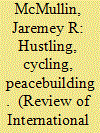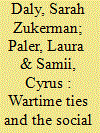|
|
|
Sort Order |
|
|
|
Items / Page
|
|
|
|
|
|
|
| Srl | Item |
| 1 |
ID:
183702


|
|
|
|
|
| Summary/Abstract |
Ex-combatant youth originated the commercial motorcycling sector in Liberia and have played a dominant role in its development. This article collates key insights narrated by one of Liberia's young ex-combatants-turned-commercial motorcyclists, Edwin Nyankoon, to build narrative accounts of peacebuilding around conceptualisation of youth livelihood, identity, and politics after war. The article contributes to diverse literatures on youth agency by emphasising the need for narrative and subject-led methodologies that anchor research questions and data analysis to research participants’ own language and narrated experiences of post war. It applies insights about everyday peace to interpret hustling as bottom-up peacebuilding, in opposition to dominant top-down peacebuilding accounts of ex-combatants. These latter accounts largely fail to see youth actors as peacebuilding agents, constructing them instead as troublemakers and interpreting their livelihood activities in terms of criminality and threat. Additionally, it argues that hustling also constitutes a peacebuilding style. More than a coping strategy or an indicator of peace, hustling-as-peacebuilding-style is performative: relational, embodied, contradictory, and recognisable to its adherents as peace-promoting even if (and arguably because) outsiders construct it as peace-negating. This analysis problematises agency, social relations, gendered identity, and collective security as they relate to ex-combatant and conflict-affected youth during peace processes.
|
|
|
|
|
|
|
|
|
|
|
|
|
|
|
|
| 2 |
ID:
173210


|
|
|
|
|
| Summary/Abstract |
While ex-combatant reintegration is vital to successful transitions from war to peace, some former fighters turn to crime following demobilization. Such criminality undermines the consolidation of political order. Leading theories of crime participation emphasize the role of both individual economic opportunities and factors related to social ties. Yet, we still know little about the social logic of ex-combatant criminality and how social and economic factors relate as drivers of crime participation. This article presents a theory of how wartime social ties – namely, vertical ties to former commanders and horizontal ties to ex-combatant peers – influence ex-combatant crime on their own and via their relationship to economic opportunity costs. We use the theory to derive predictions in the context of Colombia, and then test them with a combination of administrative data and high-quality original survey data. We find that both vertical and horizontal wartime ties are powerful drivers of ex-combatant criminality. Our evidence indicates that wartime ties mitigate the risks of criminal behavior by facilitating the transmission of criminal capabilities and pro-crime social norms. We do not find that economic conditions moderate the effect of wartime times nor do we find any indication that economic opportunity costs, on their own, predict criminality. These findings underscore the importance of wartime ties – both vertical and horizontal – to understanding post-conflict transitions and designing reintegration interventions.
|
|
|
|
|
|
|
|
|
|
|
|
|
|
|
|
|
|
|
|
|